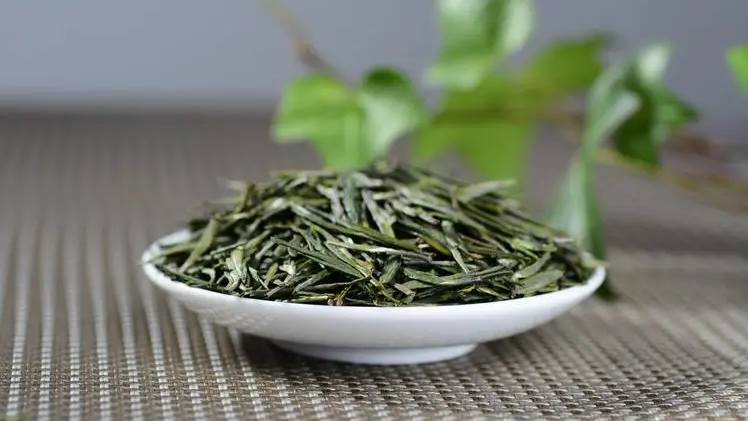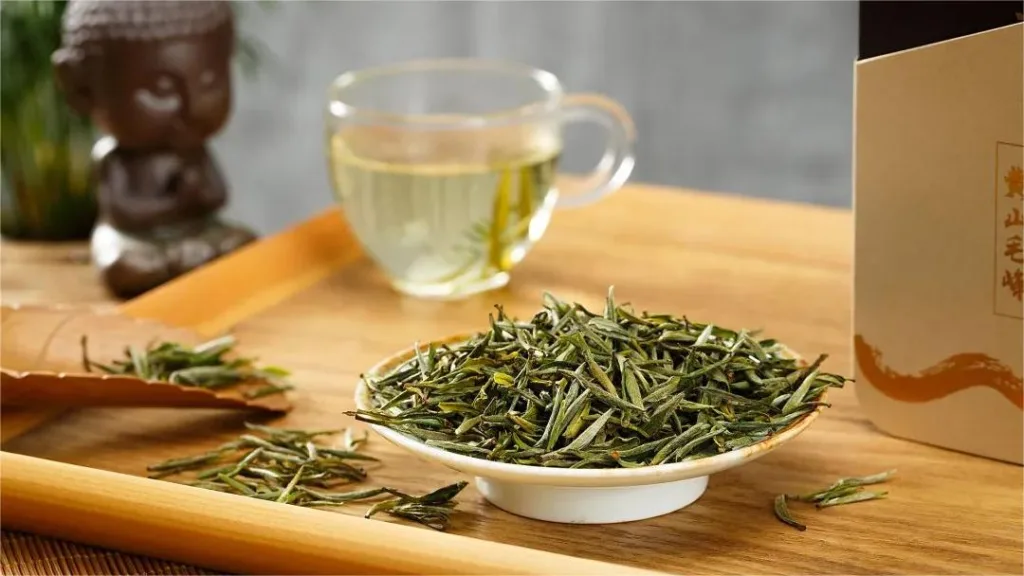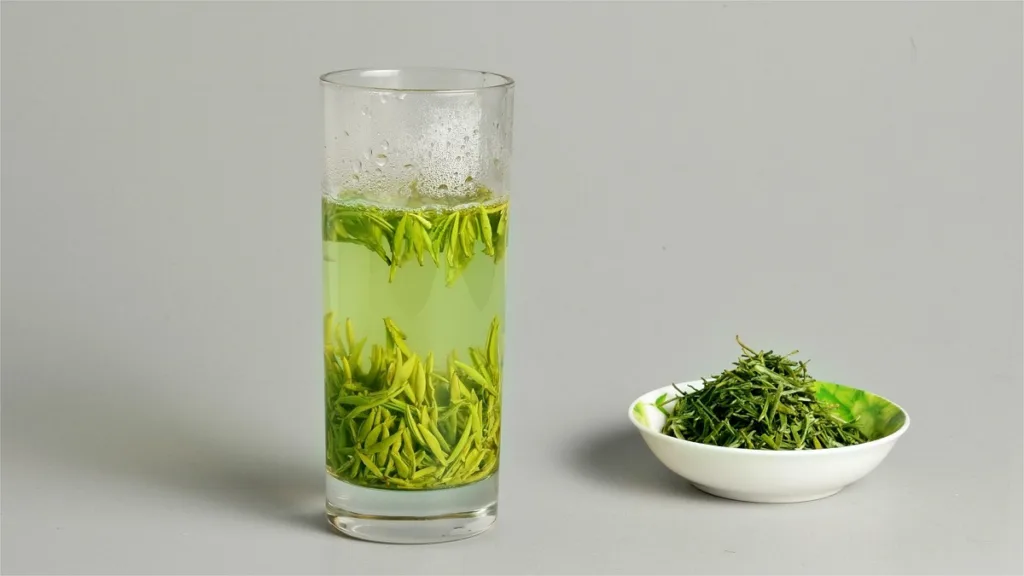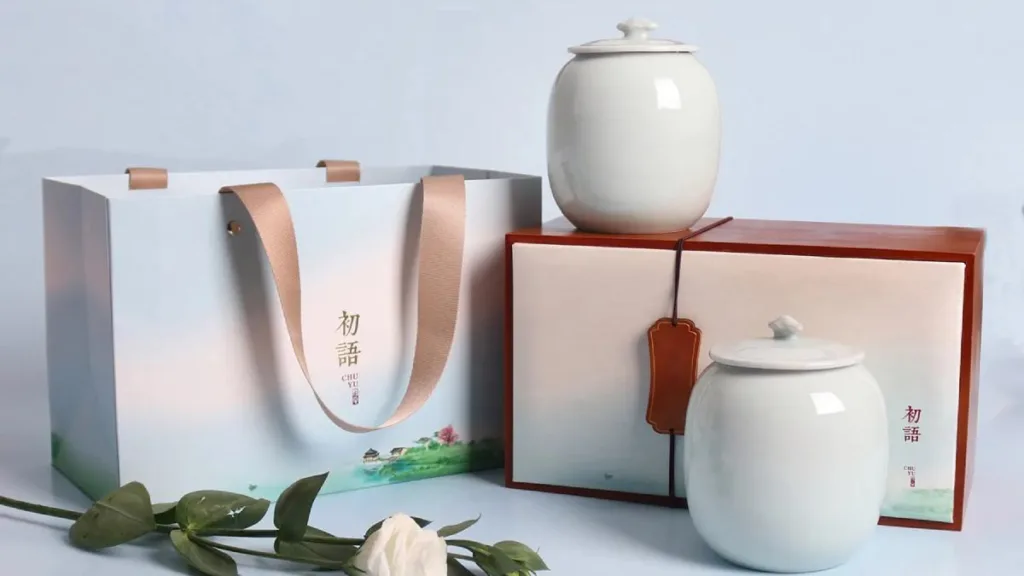Bamboo Leaf Tea, also known as “竹叶青” in Chinese, is a type of flattened green tea produced in the Emei Mountain region of Sichuan, China. It is crafted from fine bamboo leaves, lotus leaves, green tea, green tea powder, Gynostemma pentaphyllum (also known as jiaogulan), and bitter tea. Through advanced processing techniques, this tea offers a subtle and refreshing taste with a lingering aftertaste, making it an ideal natural beverage.
Bamboo Leaf Tea is the result of a modern interpretation of traditional Chinese health preservation theories and extensive research in modern nutrition. It combines traditional health-preserving tea recipes with scientific improvements and technological advancements to create a new and healthier drink.
Compared to regular health-preserving teas, Bamboo Leaf Tea incorporates green tea powder, Gynostemma pentaphyllum, and bitter tea into its recipe. These ingredients, in combination with green tea, lotus leaves, and bamboo leaves, work together to enhance the tea’s ability to clear heat and provide health benefits. Furthermore, the optimized formula improves the tea’s flavor, making it more aromatic and full-bodied.
History
Despite being a relatively recent addition to the world of tea, Bamboo Leaf Tea is rich in historical significance. The tea’s creation can be traced back to 1964, making it a mere infant compared to the millennia-old history of tea in China. The credit for its development goes to the devoted monks of the Wan Nian Temple in Emei Mountain.
As the story goes, this tea was introduced to Chen Yi, a prominent figure in the Chinese Communist Party and a respected military commander. After savoring the tea’s delicate flavor and pleasant aroma, he was so impressed that he decided to name it “Bamboo Leaf Tea.” This act of naming not only recognized the tea’s merits but also elevated its stature, giving it a prominent place in the annals of Chinese tea history.
For the people of Sichuan, Bamboo Leaf Tea holds immense cultural significance. It is not merely a beverage but also an embodiment of the Emei Mountains and a testament to the dedication of the monks who cultivated it. The tea reflects the harmony between human and nature, the timeless bond that is the heart of Chinese tea culture.
Brewing Method
- Choice of Utensils: For high-quality, delicate Bamboo Leaf Tea, it is recommended to use glass or white porcelain tea cups, without lids. This choice enhances transparency for a better tea appreciation experience. If the tea is more common and used for quenching thirst, chatting, or accompanying meals and snacks, a tea pot can be used.
- Observation of Tea: Before steeping, it is customary to observe the tea leaves. This can involve examining the dry tea leaves for color and shape or smelling the dry tea’s fragrance. This step is often omitted when dealing with regular tea.
- Cleanse the Utensils: Rinse the tea utensils with boiling water to ensure cleanliness and enhance the tea-drinking experience.
- Preheat the Cup: Use boiling water to rinse and preheat the tea cup, which is especially important in colder weather to ensure the tea stays warm during brewing.
- Tea Placement: For a typical cup with a capacity of 150 milliliters, use around 3 grams of tea (approximately one-fifth of the container’s capacity). Use a teaspoon to distribute the tea evenly among the cups.
- Steeping Process: Bamboo Leaf Tea can be steeped using two methods: the “upward pouring method” and the “middle pouring method.” The choice depends on the quality of the tea. The water temperature should be between 85-90°C, and the water volume should fill about 1/4 to 1/3 of the cup. This allows the tea leaves to absorb water and expand. After about 30 seconds, the steeping process begins.
- Multiple Infusions: Bamboo Leaf Tea can typically be steeped 2-3 times. A traditional method called “Feng Huang San Dian Tou” can be employed to allow the leaves to move within the cup evenly. It represents both proper brewing technique and a welcoming gesture to guests.
- Tea Appreciation: While enjoying Bamboo Leaf Tea, one can observe the leaves unfurl, watch the changes in the tea’s appearance, and savor the fragrance. This adds to the overall tea appreciation experience.
- Serving the Tea: Serve the tea to guests promptly to ensure it is consumed at the right temperature. This also prevents the tea from over-steeping. When re-brewing, always use fresh hot water.
Health Benefits
Bamboo Leaf Tea offers various health benefits:
- Cardiovascular and Antispasmodic Effects: The caffeine in Bamboo Leaf Tea has a strong heart-strengthening and antispasmodic effect. It can relieve bronchial spasms, improve blood circulation, and aid in the treatment of conditions like bronchial asthma and myocardial infarction.
- Stimulating Effect: The caffeine in Bamboo Leaf Tea can stimulate the central nervous system, helping people feel more alert, focused, and less fatigued, ultimately enhancing productivity.
- Diuretic Effect: The caffeine and theobromine in Bamboo Leaf Tea are natural diuretics, promoting increased blood flow to the kidneys and enhancing urine production, helping reduce edema and water retention.
- Digestive Aid: Drinking Bamboo Leaf Tea can stimulate gastric juice secretion and small intestine fluid and sodium secretion, which helps boost appetite and promote digestion.
- Antibacterial and Antimicrobial: The tea’s catechins and tannins exhibit antibacterial and antiviral properties, making it useful for treating intestinal diseases, skin infections, and inflammations of the mouth and throat.
- Anti-Atherosclerotic Effect: The tea’s high content of catechins and vitamin C can reduce cholesterol and blood lipids, making it useful in preventing atherosclerosis. Regular tea drinkers typically have lower rates of hypertension and coronary heart disease.
- Anti-Cancer Properties: Some flavonoids found in Bamboo Leaf Tea
With its history, distinct brewing methods, and health benefits, Bamboo Leaf Tea continues to capture the attention of tea enthusiasts and those seeking a delightful and wholesome tea-drinking experience. Whether sipped for its soothing taste or cherished for its health-boosting qualities, Bamboo Leaf Tea remains a remarkable contribution to the world of tea.



